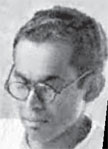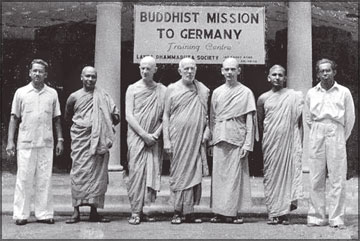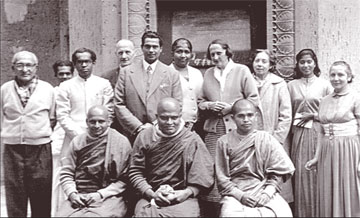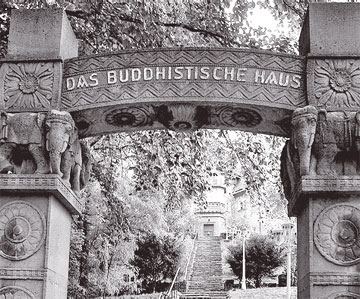Asoka Weeraratna _ Germany’s ‘Mahinda Thera’
It is when one takes into consideration the scenario of West Germany
in the aftermath of the two World Wars – bruised, battered and in
political isolation with a bad image to boot, that the arduous task of
Asoka Weeraratna could be best appreciated. The message of the Dhamma
taken to Germany by the German Dharmaduta Society that he founded,
helped the Germans, recovering from the horrors of the war, to find
inner peace.
|

Asoka Weeraratna |
Sixty years later, at an alms giving to sixty monks held at the All
Ceylon Buddhist Congress (ACBC) premises on September 23, 2012 to mark
the founding of the German Dharmaduta Society (GDS), Ven. Waskaduwe
Mahindawansa Nayake Thera said that Sri Lanka could not afford to give
Germany, ravaged by the war, houses, cars or food. Instead we gave them
a gift far more valuable - the teachings of the Dhamma which led them on
a spiritual journey eschewing materialistic riches and one which teaches
the elimination of human suffering by the conquest of the mind.
The alms giving was preceded by a procession of monks from Athula
Dassanarama Temple on Bauddhaloka Mawatha to the ACBC followed by the
launching of a website dedicated to the GDS founder and a screening of a
video documentary on the services rendered by him and the German
Dharmaduta Society.
It was during extensive travels of young Weeraratna in Europe whose
business was importing Swiss wrist watches that he saw a flicker of hope
rising from the ashes in West Germany – a spiritual hunger which he
realized Sri Lanka could satisfy with the gift of the Dhamma. On his
return to Sri Lanka, Weeraratna founded the Lanka Dhammaduta Society on
September 21, 1952, which was later renamed the German Dharmaduta
Society in 1957.

First Training Centre of the German Dharmaduta Society at
Dalugama /Kelaniya (1953) From Left: Simpson Wijeratne; Ven.
Galle Anuruddha; Ven. Nanaponika; Ven. Nanatiloka Maha Thera;
Upasaka Friedrich Moller (later known as Ven. Polgasduwe
Nyanawimala Maha Thera) Ven. Kudawella Wangissa Thera; Asoka
Weeraratna (Founder and Hony. Secretary of the German
Dharmaduta Society) |

The first Buddhist mission to Germany: At entrance to Das
Buddhistische Haus in Berlin (1957) Seated front row: Ven.
Kheminda; Ven. Soma; Ven. Vinita Standing from left: W.J.
Oliver Soysa; J.T. Sirisena; Asoka Weeraratna (Founder and
Hony. Secretary, German Dharmaduta Society), Knobloch; Henry
Amarasuriya (Chairman, Board of Trustees, GDS); Mrs. Leena
Amarasuriya, Ms. Wittiber, Mrs. Fischer, Miss Indrani
Amarasuriya and a German lady. |

Das Buddhistische Haus |
Dharmaduta Society
In Sri Lanka, with the end of the colonial rule, there emerged a
great desire among Buddhists, to promote the Dhamma globally which had
to be through the work of Dharmadutha monks and lay people. Ven.
Mahindawansa Nayaka Thera pointed out that the tradition of
‘dharmadutha’ was not new to us. It was such a mission of Emperor
Dharmasoka that brought Buddhism to Sri Lanka through Arhant Mahinda
Thera. Therefore, Asoka Weeraratna’s efforts to take Buddhism to the
West, was a continuation of this hallowed tradition.
With the establishment of the new Society in 1952, Weeraratna was
requested to survey and report to the Dharmaduta Society on the state of
Buddhism as existed in Germany. And Weeraratna, focussed on taking the
Buddha’s message to Germany, travelled throughout the country in 1953
when he met Germans who were already familiar with Buddhism, history and
culture of Sri Lanka through the work of German scholars. Herman
Oldenberg had translated the Dipavamsa in 1879 and the legendary
linguist/historian Wilhelm Geiger’s translations of Dipavamsa,
particularly the Mahavamsa had made a mark in Germany.
However, with no Lankan Mission present in West Germany as diplomatic
ties were yet to commence between the new Federal Republic of Germany
and the then Ceylon which had newly gained independence, Weeraratna,
virtually an Ambassador-at-large for Sri Lanka, got about on his own, on
his mission.
In the report following his surveys, his proposal of the need to send
a Buddhist mission to Germany to coincide with the 1956 Buddha Jayanthi,
headed the recommendations. For Weeraratna, Germany was the pulse of
Europe and the German people were the most intelligent consisting of the
largest number of Theravada Buddhists found in Europe. Therefore,
Weeraratna was confident that the Sambuddha Sasana in Germany will take
firm root. His plan included the building of a Buddhist Vihara, a
Buddhist library, a Preaching Hall and translation of the Tripitaka to
the German language.
And to accomplish these goals ‘A Million Rupee Trust Fund’ was
launched in 1954 at the Colombo Town Hall – an event attended by the
then former Prime Minister Mr. Dudley Senanayake along with Cabinet
Ministers, Diplomats, Buddhist Scholars and Prelates.
Dharmaduta work in Germany
The Trust Fund was declared as an approved charity by the Government
and by 1956, the new Headquarters of the German Dharmaduta Society at
417, Bauddhaloka Mawatha, Colombo 7, had come up. The Opening was
attended by the new Prime Minister S.W.R.D. Bandaranaike.
The first West German Ambassador to Sri Lanka, Dr. Georg Ahrens was a
prominent invitee at the ceremonial opening and was given due respect
befitting a Diplomat of high rank although West Germans were yet persona
non grata at the time. And the pioneer German Bhikku in Sri Lanka, Ven.
Nyanatiloka Maha Thera, who had been a monk in Sri Lanka for 53 years,
was made the first Patron of the GDS and he and his pupil Ven.
Nyanaponika Thera offered to teach the German language to bhikkus to
enable them to carry out dharmaduta work in Germany.
Weeraratna’s proposal to send to Germany a Buddhist Mission
materialized with three learned bhikkus from the Vajiraramaya setting
off from the historical Mihintale Rock, sailing to Germany and going
into residence in July 1957 at the famed ‘Das Buddhistische Haus’
founded in 1924 by Dr. Paul Dahlke, the pioneer German Buddhist.
Built on a six-acre plot with living quarters, library, meeting hall,
rooms, cells for guests for quiet contemplation and for receiving
instructions on Buddhist Teaching, the ‘Buddhist House’ was meant to be
a place for inner purification. Dr. Dahlke and a group of thinkers had
been living at the ‘Buddhist House’ following the Dhamma. A guest at the
‘Buddhist House’ had been Dr. Paul Dahlke’s close friend Anagarika
Dharmapala when he had stopped over in Berlin in 1925, while he was on
his way to London. The group had maintained a close link with the
International Buddhist Union, headquartered in the Island Hermitage in
Dodanduwa while the ‘Buddhist House’ had also served as the Publication
hub of Buddhist news and literature to which Dr. Dahlke himself had been
a contributor.
Notable achievement
On the death of Dr. Dahlke in 1928, the property fell into the hands
of his non-Buddhist relatives. Weeraratna on behalf of the Trustees of
the GDS and notwithstanding anti-Buddhist opposition, proceeded to
purchase the entire premises over a period of four years from 1957
following negotiations with Dr. Dahlke’s nephew. Interest of a Bank
Account – a legacy left behind by a German Buddhist – Walter Schmits who
appreciated Weeraratna’s ambitious efforts, met the cost of maintenance
of the ‘Buddhist House.’
The acquisition of the ‘Buddhist House,’ converted to ‘Berlin Vihara’
which turned out to be a semi monastery with Bhikkus taking up
residence, is considered as the most notable achievement of the GDS and
to date remains the centre of Theravada Buddhism in Germany and
continental Europe. Today, discourses on Buddhism, meditation and
discussions are conducted by Bhikkus and lay teachers at the ‘Berlin
Vihara.’ The Buddhist Library is well patronized and Das Buddhistische
Haus has been declared a National Heritage Monument by the German
government since 1995.
Sixty years on, the ‘Berlin Vihara’ which Asoka Weeraratna
established, remains a beacon, radiating Buddhist Teachings in Europe
and attracting more and more Germans and people of various other
nationalities, whether they are disillusioned by material trappings of
modern Germany or those who seek spiritual solace. The significance of
the establishment of the ‘Berlin Vihara’ is given in a nutshell when the
reputed scholar and chronicler of Buddhist History in Germany, Dr. Hans
Wolfgang Schumann stated in a seminal article on Buddhism in Germany,
that ‘the Buddhist House’ founded by Paul Dahlke in Berlin in 1924,
survived World War II in a dilapidated condition and probably would have
been auctioned and dismantled if the German Dharmadutha Society of
Ceylon which inherited a large sum of money from a German Buddhist, had
not come to its rescue. The GDS purchased it in 1958, renovated it,
furnished with additional rooms, a good library and stationed Ceylonese
Bhikkus there who take charge of regular lectures and meditation
courses.”
Historical events
Dr. Schumann further says in this article that “the organizational
help which Buddhist societies in Asia, in particular Ceylon, in several
critical periods have extended, has saved the flame of Dhamma in Germany
from being blown out by the storm of historical events. Isn’t this for
the Germans, reason enough to be grateful?”
With Weeraratna’s mission in Germany accomplished, he turned to
re-building in Sri Lanka the most supportive and protective layer of
Buddhism – meditation. Towards this end, he established the Mitirigala
Nissarana Vanaya in 1967, a Forest Hermitage situated not far from
Colombo and comprising 30 independent dwellings (Kutis) for Buddhist
Yogi Monks who were guided by the outstanding meditation teacher, the
late Venerable Matara Sri Nanarama Mahathera.
An arduous task completed, Weeraratna resigned from the post of
Honorary Secretary of the GDS, and entered the Bhikku Order in 1972, as
Ven. Dhammanisanthi Thera. Living the life of a forest monk at the
Mitirigala Nissarana Vanaya Aranya, for a period of 27 years, Ven.
Dhammanisanthi passed away in 1999 at the age of 80. A life well-spent
in the true spirit of the Buddha Dhamma, his funeral, reflecting the
fundamental concepts of Buddhism, was conducted in a simple, austere
manner in accordance with his wishes. |





